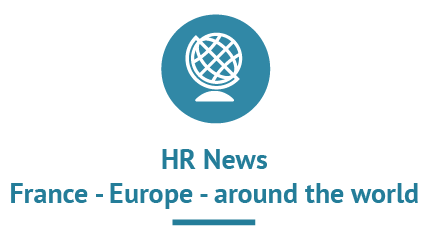|
If you are having trouble viewing this email, open it with your internet browser,
download the PDF version
or contact us.
|
 |
| #44 - April 2022 |
| PDF version - Manage your subscription - Search - Archives |

|
|
vision RH is a newsletter published by the French Directorate General for Administration and the Civil Service (DGAFP). It draws on information sources and reports issued by public administrations, the private sector, international organisations and the press, in several different languages. It aims to provide a broad view of current human resources and civil service initiatives. The monthly focus of this 44th issue is dedicated to the trends in retirement plans and more particularly to the changes in access conditions, scopes of application and financing methods. As usual, we present you the last trends in several countries on this theme and the inspiring ways in which they are implementing them. vision RH was launched in January 2018 and has just passed the 40,000 subscribers’ mark. Throughout the 45 issues published, we aimed to provide you with an overview by presenting a selection of French and foreign initiatives. Getting retired, our publication will take a break with the ambition to continue to inform you soon. I thank you for your loyalty and your feedback which has made us progress! Jean-François Adrian,
|
|

|

|
| Trends in retirement plans, a reflection of societal choices | |||||
|
Whether public employment pension schemes align with private-sector rules, cover all or part of the workforce (e.g. tenured civil servants vs. contract employees) or retain their own funding sources, there is little doubt that they will continue to see changes in the years to come. There is a need to ensure public pensions remain economically viable while also factoring in societal considerations, such as remaining aligned with the rest of the working world. (1) This means regularly adjusting the minimum age for entitlement to pension benefits and/or the required number of years of service (with or without contributions) and what the penalties for early retirement look like. In Germany, only civil servants (40% of the public workforce) have a standalone pension plan. Since 2012, they can apply for maximum pension benefits – equal to 71.75% of their most recent base compensation – from age 63, so long as they have made 40 years of contributions. Like in France, bonuses and other payments are not included in pension calculations. In 2021, the average pension rate was 67.2%. In Spain, public employees also have a self-funded pension plan with its own special rules (retirement age of 61 and full pension with 30 years of service), but as from 2011 this no longer applies to new hires. Contributions are now paid into the general pension fund and the legal retirement age is 65, set to increase to 67 in 2027. In 2019, Italy – the European country with the highest average age of its working-age population – opted for a new calculation model. The new “quota 100” scheme offers a straightforward way of determining pension entitlement: the sum of the retirement age and the number of years of service must equal 100. To encourage workforce renewal, the government has committed to hiring and training replacements during the six-month period between giving notice and retirement. In the United Kingdom, civil servants have seen a number of different pension schemes over the years. The current one, “Alpha”, has been in place since 2015. The retirement age is 65 and the pension calculation is based on career-long average earnings. As for contributions, they increase in step with the annual salary scale (ranging from 4.60% to 8.05%). Some countries, like Sweden, have long had a single system after eliminating special schemes. Others have more recently made the same choice, like Austria and the Netherlands (after adopting the “WNRA” act to normalise the legal status of civil servants). Another option, rolling back the maximum retirement age so that people can work longer if they want to, has recently been taken up by Ireland and Portugal. When a worker takes a pause in their career, it usually affects their pension credits. In Belgium, periods of caregiving leave are now included in pension calculations. When Norway wanted to harmonise public- and private-sector rules in early 2020, it introduced a flexible and innovative new model. Under the agreement signed by the four leading labour unions, workers have the option of retiring at age 62 or working until age 75, the right to continue working and earning employment income without it reducing their pension benefits, and a 10% bonus for civil servants who stay on after becoming eligible for early retirement (due to the nature of their work or an early entry into the workforce). The new system in Finland includes a graduated scale for pension accrual rates: 1.5% between age 18 and 53, 1.9% between age 53 and 63 and 4.5% between age 63 and 68.
|
|||||
|
|||||
|
|
|||||

|
|||||

|

|

|
| Europe: shared values and challenges of governments | |||||
|
On March 17 in Strasbourg, the EU ministers for public sector transformation and the civil service signed a declaration on the shared values and challenges of their countries’ governments. The declaration, which has three areas of focus, advocates for an initiative promoting the mobility of civil servants across Europe, as part of a new strategy of the European Public Administration Network. |
|||||
|
|||||
|
|
|||||

|
|||||
| Switzerland: compensation system improvements | |||||
|
Should pay rises remain tied to performance appraisals? Yes, according to a recent decision of the Swiss Federal Council, but it has also proposed some improvements to the compensation system. Pay rises for individual employees will be based on both internal and external salary progression curves, and feedback meetings will be more frequent and less formal. |
|||||
|
|||||
|
|
|||||

|
|||||
| Spain: public innovation space | |||||
|
The Spanish national civil service training school (INAP) has created a lab to support transformation projects by helping to highlight the value of technology, talent and experiential knowledge. Open to all government employees looking for coaching or advice, the lab is designed to be a permanent space for debate, analysis, discussion and collaboration on issues of public policy and services. « If you work in the public sector and want to get things done, join us. Your ideas and skills are welcome »
|
|||||
|
|||||
|
|
|||||

|
|||||

|

|
| Germany: alternative public recruiting resource | |||||
|
Public-sector recruiting is not limited to the German government job portal (bund.de). There is another service provider offering a range of recruiting services. In addition to publishing job vacancies and offering dynamic search features for applicants, it offers employers a variety of services letting them select, manage and respond to the applications they receive with the help of customisable management assistants. |
|||||
|
|||||
|
|
|||||

|
|||||
| Belgium: civil servants trained to provide support to citizens | |||||
|
The aim of the “Connectoo” initiative is to help all citizens access online public services. A training course is open to all Belgian federal government employees interested in becoming “digital assistants”, with two levels of certification: a basic level and an expert level, targeted to employees in regular contact with the public. The goal of the project is to train 5,000 assistants each year, for a total of 10,000 by 2024. |
|||||
|
|||||
|
|
|||||

|
|||||
| OECD/EU: impacts of the CAF during the pandemic | |||||
|
How did the Common Assessment Framework (CAF) help governments address the organisational challenges presented by the pandemic? As part of a research study on 12 Member States, the Maastricht-based European Institute of Public Administration presents several case studies and best practices. It also presents the results of the study and offers solutions for strengthening resilience in anticipation of future shocks, while maintaining the level of quality the CAF model is known for. « The survey showed that the pandemic has largely impacted organizations, in particular on personnel and process criteria »
|
|||||
|
|||||
|
|
|||||

|
|||||

|

|
| France: educational game on preventing corruption | |||||
|
With the support of French ministerial transformation and HR innovation funding, an an educational game was developed (En quête d’intégrité, or “seeking integrity”) to help players better understand the different types of corruption offences (bribery, influence peddling, favouritism, unlawful taking of interest, misappropriation of public funds, extortion by public officials), learn how to identify high-risk situations and find out about preventive measures. |
|||||
|
|||||
|
|
|||||

|
|||||
| United Kingdom: new senior civil service training college | |||||
|
Announced as the “centrepiece” of the British management skills development reform, the Leadership College for Government will open in April. It will focus on training government managers in three main areas – people, performance and partnership skills – to equip them to solve today’s most complex problems. It will include an accelerated development scheme. |
|||||
|
|||||
|
|
|||||

|
|||||
| Italy: LADidattica, an initiative to improve digital skills | |||||
|
Communicating online and on social media, working with open data, managing interoperability – these are some of the strategic skills the Italian government wants to equip its civil service with. To do so, it has launched a wide-ranging certificate training programme available to all public employees. Developed by educators and experts, the course will be made up of 12 two-hour sessions. More than 1,500 people have already enrolled. « With LADidattica we wanted to create a more intuitive method of acquiring the knowledge that our administration needs »
|
|||||
|
|||||
|
|
|||||

|
|||||

|

|
| France: private-sector partnership agreement | |||||
|
On 9 March 2022, The French Directorate-General for Administration and the Civil Service and National Association of Human Resources Managers signed a partnership agreement to share best practices and initiatives being carried out on both sides. It is also an opportunity to work on shared problems such as quality of life in the workplace, shared responsibility, legislative changes, and lifelong training and career guidance. |
|||||
|
|||||
|
|
|||||

|
|||||
| Ireland: framework for blended work arrangements | |||||
|
A legal framework for blended working has been reached for Irish civil servants, formalising a practice that has gradually expanded over time to become the norm. The framework, agreed with unions, gives all civil servants the right to apply for remote or blended working and, if their application is turned down, to have the decision reviewed. Departmental policies must also set out a decision-making process that ensures a consistent approach to assessing applications, which ensures fairness across the organisation. |
|||||
|
|||||
|
|
|||||

|
|||||
| Portugal: LABPATS, a laboratory for healthy working environments | |||||
|
As part of its EATS (ecosystems for healthy work environments) initiative, the Portuguese civil service has created a laboratory that will study the health and wellbeing of workers and organisations. The goal is to promote their protection without neglecting performance. Working as a network, under a collaborative and multidisciplinary approach, the lab will bring together researchers, experts, academic institutions, non-profits, non-governmental organisations and government departments. « It is obvious that we must be able to create the conditions to give and receive the best from each of our employees »
|
|||||
|
|||||
|
|
|||||

|
|||||

|

|
| Legrand joins the fight against domestic violence | |||||
|
While there may be a tendency to see domestic violence as a personal issue that falls outside the purview of the workplace, a majority of victims are working women who would welcome support from their employer. (1) Legrand, a French manufacturer of electrical and electronic fittings whose workforce is 36% female, decided to make domestic violence a major focus of its new corporate social responsibility (CSR) policy. The company’s first course of action was to sign two instruments in 2021: • A commitment charter created by OneInThreeWomen, Europe’s leading network of companies working to address domestic violence, and the Fondation Agir contre l’Exclusion • A corporate pledge against domestic violence sponsored by France’s Ministry for Gender Equality The primary goal is to make the workplace a safe and welcoming space, as well as to be able to refer employees to the right experts. In practice, this means teams are taught how to foster a climate of trust, where early warning signs are more likely to be picked up on, and managers receive training on how to provide confidential support. The company is working to give visibility to this important issue while also ensuring victims are treated with dignity and respect.
|
|||||
|
|||||
|
|
|||||

|
|||||

|

|
| A tribute to the Ukrainian public servants on the front lines of cyber warfare | |||||
|
A human tragedy has been playing out in Europe. A sovereign nation is under brutal attack, its cities savagely destroyed and thousands of its people killed. While civilian and military resistance efforts are fighting back against the invasion, public-sector employees have teamed up and pooled together their skills to ensure that key tech infrastructure remains operational so that the government can continue to function. In a world where cyber attacks have become powerful weapons capable of taking down institutions, the government in Kiev had the foresight to prepare. Last autumn, with the help of the Organization for Security and Co-operation in Europe and experts sent by Germany and the United Kingdom, the country rolled out a wide-ranging training initiative for its civil servants. .
To start, an online test, available on two sites, was used to select participants. The next step involved a programme for basic skills consisting of nine online modules and a two-day classroom session, a mobile training centre designed to travel around the country, and a team of 52 teaching staff responsible for training participants on such topics as how to prevent and manage digital threats (hacking, phishing, disinformation). To educate the entire workforce about potential risks (which would later materialise), four videos were put together and posted on all internal networks. A brochure was widely distributed containing data and statistics on previous incidents around the world and explaining best practices. To round out the initiative, the Ministry of Digital Transformation lent its expertise to develop “Digigram”, a chatbot designed to answer common questions about cyber hygiene, different types of attacks and security rules. As expected, attempted attacks were made against government sites at the outset of the conflict, but the reaction was swift, proving the effectiveness of the government’s upskilling initiative. In closing, we would like to share this message of hope with our Ukrainian colleagues: “Пишайтеся своєю незмінною відданістю відстоюванню цінностей верховенства права! Отримайте нашу найбільшу підтримку в ці важкі часи.” (1)
|
|||||
|
|||||
|
|
|||||

|
|||||

|
|
Share
|
||||
|
||||
| SUBSCRIBE - UPDATE YOUR SUBSCRIPTION - ARCHIVES - RSS - UNSUBSCRIBE |
|
French Directorate-General for Administration and the Civil Service (DGAFP)
Publication Manager: Nathalie COLIN Managing Editor: Nathalie GREEN Editor-in-chief and Autor: Jean-François ADRIAN Layout and graphic design: Jean-François ADRIAN and Aphania. The texts of the publication do not reflect the point of view of the DGAFP
In accordance to the French Act n°78-17 of 6 January 1978 on information technology, data files and civil liberties and to the european General Data Protection Regulation (GDPR), your personal data is stored securely and you are entitled to access, correct and delete them. To do so, you should send an e-mail to (contact-visionrh@kiosque.bercy.gouv.fr) or write to DGAFP: 139, rue de Bercy - 75012 Paris; France.
The links to a machine translation are accessible with the only Chrome browser Reproduction is authorized with mention of the source © DGAFP 2022 / N° ISSN: 2606-7528. |
|
|





